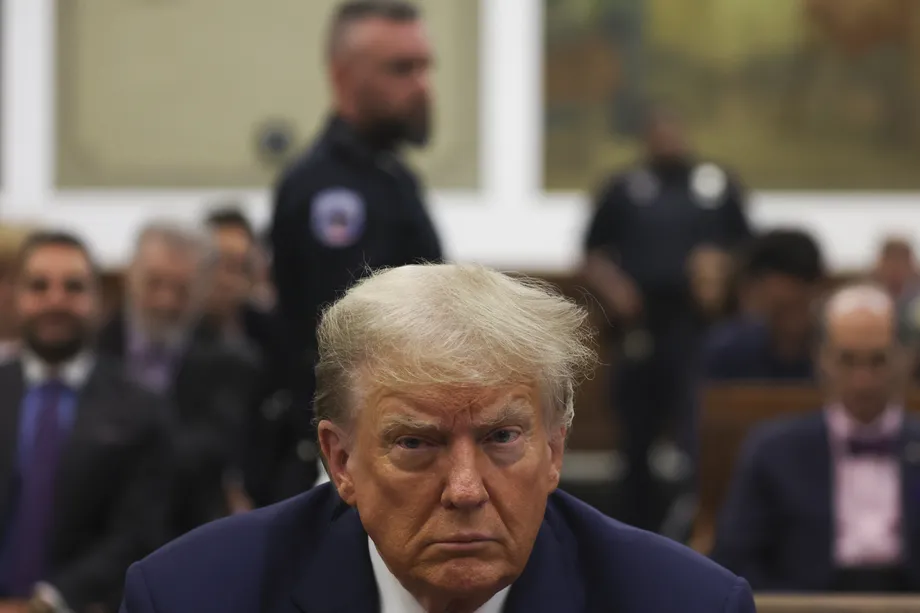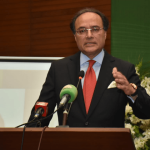
Donald Trump is currently liable for about half a billion dollars as a result of two recent verdicts.
The former president was sentenced to $355 million by a New York judge on Friday for lying to lenders about his net worth in order to secure better loan terms. He was also prohibited from holding a leadership position in any New York-based corporation for three years. Additionally, in January, a Manhattan jury ruled that Trump must pay $83.3 million to writer E. Jean Carroll for defaming her following her allegations of rape. (In May, a different jury judged Trump accountable for Carroll's alleged sexual abuse throughout the 1990s.)
The combined judgments from these two claims are greater than the cash that Trump stated he had on hand in April of last year, which might leave him in a difficult financial situation as he also has to pay back creditors and accrue increasing legal costs. He is expected to appeal these rulings, but even if he does, he will probably still need to front the money while the procedure is underway or obtain a bond, which has its own set of requirements.
That would typically just be a minor annoyance for a wealthy and well-connected individual like Trump, who could always sell off part of his holdings or take out a larger loan to pay for his immediate needs.
With an estimated net worth in the low billions, Trump is not only among the richest men in the nation but he is also a candidate for reelection to the presidency. Furthermore, having such large debts and being cash-strapped might be a major problem for any candidate for public office, much less the presidency.
According to Virginia Canter, chief ethics counsel at the Citizens for Responsibility and Ethics in Washington, a nonpartisan watchdog organization that has documented Trump's abuses of power and brought legal action against him, "it's pretty scary from an ethics perspective."
There were many conflicts of interest throughout Trump's first term, and he owed a lot of it to his financial stability—or lack thereof, depending on your point of view. Upon his attempt to rig the 2020 election, he owed hundreds of millions of dollars, the majority of which would mature over the next four years from loans taken out to assist salvage his failing companies. He refused to sell off his companies, which brought in millions of cash from taxpayers, and he carried on doing business with foreign nations during his presidency—a move he promised to continue in a second term.
There's a good chance that things will go wrong because of his numerous relationships to multinational corporations and other countries. Because of this, the 2020 New York Times exposé that revealed his enormous debt from his first term wasn't simply embarrassing for Trump, who frequently makes false claims to his wealth.
"For a person with access to U.S. classified information to be in massive financial debt is a counterintelligence risk because the debt-holder tends to have leverage over the person, and the leverage may be used to encourage actions, such as disclosure of information or influencing policy, that compromise U.S. national security," the former head of the Justice Department's National Security Division told Time magazine in 2020.
As Trump campaigns for a second term, his personal finances are becoming increasingly relevant, especially now that he has to pay hundreds of millions of dollars in damages from the two civil lawsuits.
And with his criminal cases still looming, things could get even worse for him. His debt “makes him prime for corruption and really exploiting his office for his own personal gain,” Canter said.
Is Trump actually in any financial trouble?
Transparency is not one of the many things that Trump is known for. His business is not publicly listed, thus its finances are frequently ambiguous, and he is well-known for withholding his tax records from the public during his campaign for office. His personal wealth and the profits of his corporate empire have therefore always been a mystery.
However, it has been evident from lawsuits, media stories, and his sporadic, if limited, public disclosures that Trump's frequently glowing accounts of his riches are wildly inaccurate.
It's especially unclear how much cash he has on hand. Last year, during a deposition, Trump declared that he had $400 million in cash. Although that seems like a lot of money, the former president probably wouldn't have much of it left after covering the costs associated with his most recent cases. (While he occasionally may use campaign money to pay for specific legal fees, he usually isn't allowed to use it to settle his debt for damages.)
Aside from lawsuits, Trump has a large debt load. He owes at least $200 million in debt, according to his financial statements that were submitted to the Federal Election Commission last year. Additionally, Forbes reports that in 2021, his company owed almost $1.3 billion.
Trump’s income and lack of transparency really matters
In the New York Times' 2020 piece on Trump's stolen tax returns, one of the most shocking revelations is that, despite his extreme wealth, there were years in which he paid little to no federal income tax. At the time of his first presidential victory in 2016, he had paid a total of $750 in federal income taxes. This could help explain Trump's initial refusal to make his tax returns public, even though since the 1970s, it has been standard practice for presidential candidates to do so.
Even though it is extremely concerning that Trump and other rich Americans are able to pay almost no federal income taxes, the ramifications of his lack of openness are even more dire.Special interests and foreign governments have plenty of opportunities to try to purchase influence in Trump's administration through his network of business dealings. For instance, while his president, foreign governments gave millions of money to Trump's companies. During Trump's four years as president, a Chinese state-owned bank paid $7 million to rent space at Trump Tower in New York. Following Trump's resignation, the corporation ceased leasing space.
Most Americans don't have the remarkable amount of trust in the former president needed to think that the possibility of that kind of money couldn't affect Trump's program or his travel plans.Ultimately, how could a president legitimately work toward, let's say, a trade agreement with a country with which he personally does business? Trump's activities have led to accusations that he violated the emoluments clauses of the US Constitution, which prohibit presidents from receiving additional compensation from foreign governments, US states, or the federal government in order to prevent undue influence.
Trump also possessed more debts from his presidency that were not disclosed. Even though many of these creditors were big financial institutions, several were less well known. For example, according to Forbes, Trump had debt from an undisclosed foreign creditor and owing over $20 million to a South Korean business when he was elected president.Even though Trump paid off the loan in the first six months of taking office, there are still a number of possible conflicts of interest with him that make it difficult to monitor.
Before the election of 2016, Trump falsely claimed that his wealth served the public good. He declared that he would not be subject to anyone and that he would self-fund his campaign, but he broke that promise.However, Trump's issue goes beyond his incapacity to finance his own presidential campaigns. Special interests have an avenue to gain favor with him because he is continuously searching for fresh loans or sources of money. For instance, Axos Bank, whose CEO is a Republican contributor, stepped in and loaned the former president some $225 million after his previous lenders severed ties with him following the January 6 uprising, helping Trump shore up his coffers. (Trump has also disclosed more revenue from outside sources, such as a recent agreement he made with a Saudi company.)
Although Trump's lack of transparency may have helped him up until this point by insulating him from possible political and legal risks,In addition, should he be elected to a second term in November, it might have far-reaching effects.
Canter stated, "A lot of people thought Bernie Madoff was rich." "Many characters present themselves as wealthy, but when you open the cookie jar, nothing is inside."










